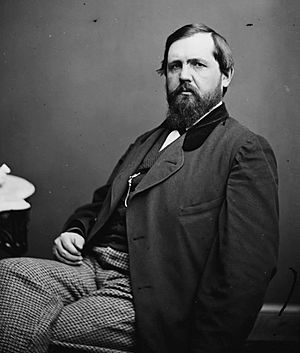Edwin Hanson Webster facts for kids
Quick facts for kids
Edwin Hanson Webster
|
|
|---|---|
 |
|
| Member of the U.S. House of Representatives from Maryland's 2nd district |
|
| In office March 4, 1859 – July 1865 |
|
| Member of the Maryland Senate | |
| In office 1855–1859 |
|
| Preceded by | Henry D. Farnandis |
| Succeeded by | Franklin Whitaker |
| Constituency | Harford County |
| Personal details | |
| Born | March 31, 1829 near Churchville, Maryland, U.S. |
| Died | April 24, 1893 (aged 64) Bel Air, Maryland, U.S. |
| Resting place | Calvary Cemetery Harford County, Maryland, U.S. |
| Political party | Whig American Party Unionist Unconditional Unionist |
| Spouse |
Caroline H. Earl
(m. 1855) |
| Alma mater | Dickinson College |
Edwin Hanson Webster (born March 31, 1829 – died April 24, 1893) was an important American politician. He served as a U.S. Congressman for Maryland from 1859 to 1865. He represented Maryland's second district during a very important time in American history.
Contents
Who Was Edwin Webster?
Edwin Hanson Webster was born on March 31, 1829, near a town called Churchville, Maryland. From a young age, he received a good education. He went to the Churchville Academy and later the New London Academy in Pennsylvania.
His College Years and Law Studies
In 1847, Edwin Webster graduated from Dickinson College in Pennsylvania. After college, he worked as a teacher. He also started studying law with a lawyer named Otho Scott in Bel Air, Maryland. He worked hard and became a lawyer himself in 1851. After that, he started his own law practice in Bel Air.
Edwin Webster's Public Service
Edwin Webster was very involved in politics and public service. He believed in helping his community and country.
Early Political Steps
Even before he became a lawyer, Webster tried to get involved in politics. In 1851, he ran for the job of state's attorney. He was a member of the Whig Party at the time. He lost that election by a very small number of votes.
Serving in the Maryland Senate
From 1855 to 1859, Webster was a member of the Maryland State Senate. This is a group of lawmakers who help create laws for the state of Maryland. In 1856, his fellow senators chose him to be the president of the senate. That same year, he also served as a presidential elector. This means he was part of the group that officially votes for the President of the United States.
During the Civil War
The American Civil War was a very difficult time for the United States. Edwin Webster played a role in it. He became a colonel, leading the 7th Regiment Maryland Volunteer Infantry. He served in this military role during 1862 and 1863.
Time in Congress
Edwin Webster was elected to the United States Congress several times.
- First, he was elected as a candidate for the American Party, also known as the Know Nothing party.
- Then, he was elected as a Unionist.
- Finally, he was elected as an Unconditional Unionist.
He served in Congress, representing Maryland's 2nd congressional district, from March 4, 1859, until July 1865. During his time in Congress, he made an important vote. He voted to end slavery across the country.
After Congress
After leaving Congress in 1865, President Abraham Lincoln appointed him to a new job. He became the collector of customs at the Port of Baltimore. This job involved collecting taxes on goods that came into the port. He held this position until 1869.
Later, he went back to being a lawyer in Bel Air. But in 1882, President Chester A. Arthur appointed him collector of customs again. He served in this role until 1886. In 1882, he also started working in banking. He became the president of the Harford National Bank and continued in that role until he passed away.
Family Life
Edwin Webster married Caroline H. (née McCormick) Earl in June 1855. They had at least four children together. Their children were named J. Edwin, Ida M., Bessie, and Caroline H.
Later Years and Death
Edwin Hanson Webster passed away in Bel Air, Maryland, on April 24, 1893. He was buried in Calvary Cemetery, which is near Churchville.
 | Audre Lorde |
 | John Berry Meachum |
 | Ferdinand Lee Barnett |

